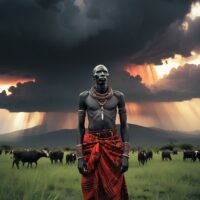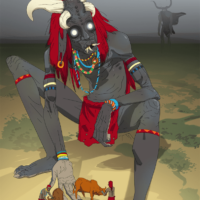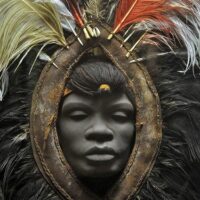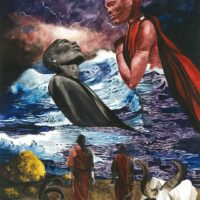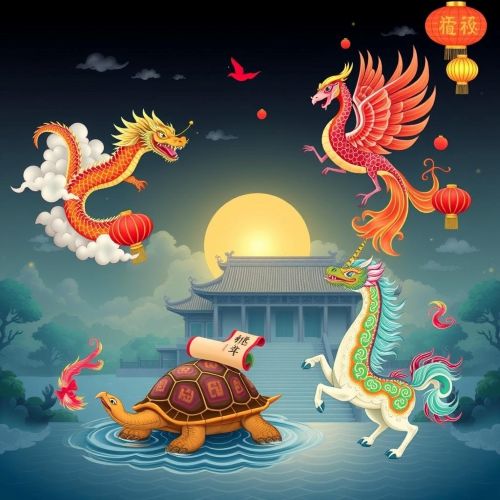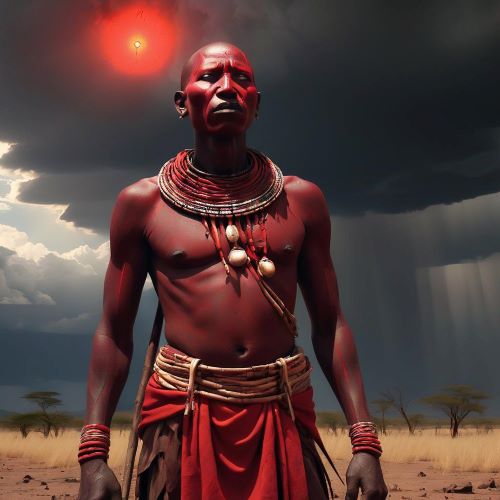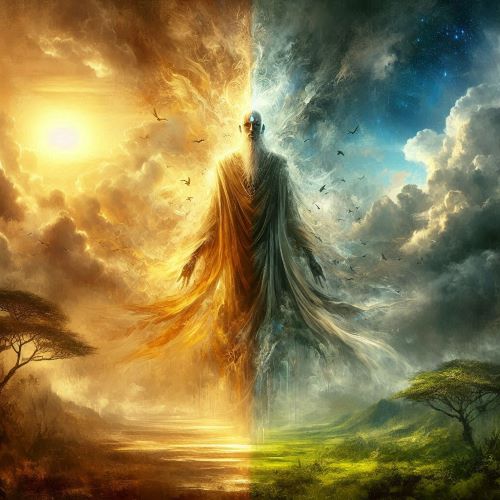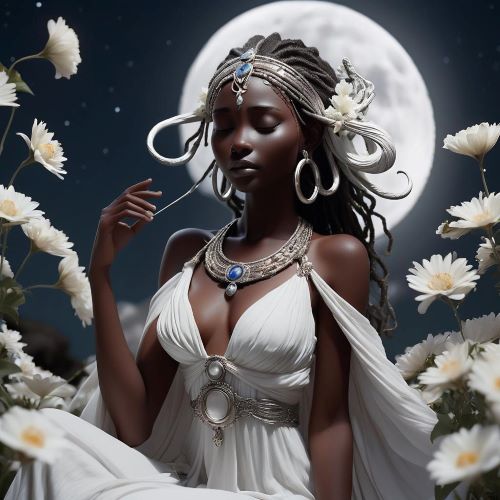Enkai-Narok : The Black God
Listen
At a glance
| Description | |
|---|---|
| Origin | Maasai Mythology |
| Classification | Gods |
| Family Members | N/A |
| Region | Kenya, Tanzania |
| Associated With | Rainfall, Fertility, Prosperity |
Enkai-Narok
Introduction
Enkai-Narok, known alternately as Enkai, holds a significant place in Maasai mythology, embodying both benevolent and malevolent aspects. Revered by the Maasai people of Kenya and Tanzania, Enkai-Narok, often referred to as the Black God, symbolizes benevolence and prosperity within their cosmology. As a central deity in their cultural heritage, Enkai-Narok’s influence extends over the natural world, embodying the life-giving forces of rain, thunder, and fertile land essential to the Maasai pastoral lifestyle. Enkai-Narok represents one facet of the supreme deity Enkai, who encompasses both nurturing and wrathful characteristics. Within the rich tapestry of Maasai mythology, Enkai-Narok’s presence underscores the interconnectedness of the divine with the earthly realm, serving as a pillar of spiritual guidance and sustenance for the Maasai people.
Physical Traits
Enkai-Narok’s depiction often portrays them as a towering figure adorned with symbols of cosmic authority, embodying immense stature and eyes gleaming like the brightest stars. Some interpretations suggest Enkai-Narok’s ability to shape-shift, facilitating interaction with mortals and divine beings alike. Their physical presence mirrors the majesty of the natural world, reflecting the profound reverence of the Maasai towards their environment. Unlike traditional deities with human-like forms, Enkai-Narok transcends physical embodiment, associated primarily with the color black symbolizing life-giving rain clouds. Although lacking a tangible form, Enkai-Narok’s influence manifests through essential elements sustaining life, notably the rains crucial to the Maasai pastoral lifestyle.
Family
Enkai-Narok exists within the expansive realm of Enkai, encompassing both creation and destruction. Portrayed as the benevolent counterpart to Enkai Na-Nyokie, the Red God associated with drought and famine, Enkai-Narok embodies prosperity and abundance. These dual aspects reflect the cyclic nature of life, oscillating between periods of prosperity and hardship. While some interpretations perceive Enkai as a singular entity capable of both kindness and fury, the Maasai mythology presents Enkai as a singular deity, not part of a familial pantheon like in other mythologies.
Enkai is revered as the creator of all life, forging a familial bond with every living being. Within this cosmic framework, Enkai-Narok assumes a central role, interwoven with familial ties to other divine entities such as Enkai, the god of rain and fertility, and Engai, the deity of the sky. These connections underscore the interconnectedness of nature within Maasai cosmology, with Enkai-Narok serving as a conduit between the celestial and earthly realms.
Other names
Enkai-Narok, also recognized as Enkai, Engai, or En-kai, presents various name variations reflective of the diverse Maasai tribal dialects. The fluidity in naming extends beyond Enkai-Narok, as the Maasai language offers nuanced terms to portray different facets of divine nature. “Enkai” serves as a general term denoting the supreme deity, encompassing both the Black and Red God aspects. Neighboring communities, such as the Kikuyu and Meru, use “Ngai” to reference the divine force.
The specific designation “Enkai-Narok” accentuates the Black God’s connection with auspicious elements, translating to “Black Enkai” and symbolizing the life-sustaining rains he bestows. Understanding these varied appellations provides insight into the intricate layers of the Maasai belief system. Additional alternative names, like “Enkai-Nanyokie,” highlighting provision and abundance, and “Enkai-Oibor,” signifying association with the sun’s nurturing warmth, further enrich the cultural tapestry of Maasai mythology.
Powers and Abilities
Enkai-Narok, a celestial being of immense power, wields a diverse array of abilities that shape the natural world and impact mortal lives. Revered as the controller of seasonal cycles, Enkai-Narok regulates rainfall to ensure land fertility, crucial for sustaining life. Some myths portray Enkai-Narok as the guardian of the afterlife, guiding departed souls to their final resting place, emphasizing their role beyond earthly matters. Enkai-Narok is frequently invoked in rituals for protection, prosperity, and spiritual guidance, reflecting their enduring significance in Maasai religious practices. His dominion extends as vast as the sky he inhabits, serving as the ultimate life source for the Maasai people. Particularly celebrated is his ability to summon rain through thunder and dark clouds, vital for nourishing the land and sustaining cattle, pivotal to Maasai livelihoods.
Enkai-Narok’s association with fertility ensures crop growth and livestock health, essential elements of the Maasai way of life. Beyond physical manifestations, Enkai-Narok maintains a spiritual connection with the Maasai, offering guidance and protection. The Laibon, Maasai spiritual leaders, act as intermediaries between Enkai-Narok and the people, conducting rituals to appease the deity and secure his continued blessings. Enkai-Narok’s benevolent nature, as an aspect of Enkai, underscores his role as the bestower of fertility, rain, and prosperity upon the Maasai people, reinforcing his pivotal position within their belief system.
Modern Day Influence
Enkai-Narok’s enduring influence pervades Maasai society, evident in the prevalent rituals seeking rain and prosperity. This belief system has instilled in the Maasai a profound reverence for nature, emphasizing harmony with the environment—a principle now central to conservation efforts within Maasai territories. Despite modern influences, Enkai-Narok’s significance remains deeply rooted in everyday life, from pre-hunt rituals to rites of passage ceremonies. As a symbol of cultural identity, Enkai-Narok bridges tradition with modernity, with stories passed down through generations preserving ancient wisdom amidst societal change. Enkai-Narok’s teachings resonate with contemporary efforts toward environmental conservation and sustainable development, reflecting his ongoing relevance in Maasai life.
Cattle, revered as sacred gifts from Enkai-Narok, maintain their central role in Maasai culture, symbolizing wealth and status. Traditional ceremonies and prayers continue to honor Enkai-Narok, especially during droughts, as the community seeks divine intervention for rainfall. The Maasai embrace the concept of balance embodied by Enkai-Narok and Enkai Na-Nyokie, recognizing the delicate equilibrium between prosperity and adversity. This awareness underscores their commitment to maintaining a respectful relationship with the environment, a cultural value passed down through generations. Despite societal changes, the Maasai’s reverence for Enkai-Narok remains steadfast. His presence serves as a poignant reminder of nature’s power and the importance of environmental respect, embodying the enduring hope for continued blessings from the Black God.
Related Images
Frequently Asked Questions
What is lorem Ipsum?
I am text block. Click edit button to change this text. Lorem ipsum dolor sit amet, consectetur adipiscing elit. Ut elit tellus, luctus nec ullamcorper mattis, pulvinar dapibus leo.
What is lorem Ipsum?
I am text block. Click edit button to change this text. Lorem ipsum dolor sit amet, consectetur adipiscing elit. Ut elit tellus, luctus nec ullamcorper mattis, pulvinar dapibus leo.
What is lorem Ipsum?
I am text block. Click edit button to change this text. Lorem ipsum dolor sit amet, consectetur adipiscing elit. Ut elit tellus, luctus nec ullamcorper mattis, pulvinar dapibus leo.
What is lorem Ipsum?
I am text block. Click edit button to change this text. Lorem ipsum dolor sit amet, consectetur adipiscing elit. Ut elit tellus, luctus nec ullamcorper mattis, pulvinar dapibus leo.
What is lorem Ipsum?
I am text block. Click edit button to change this text. Lorem ipsum dolor sit amet, consectetur adipiscing elit. Ut elit tellus, luctus nec ullamcorper mattis, pulvinar dapibus leo.

